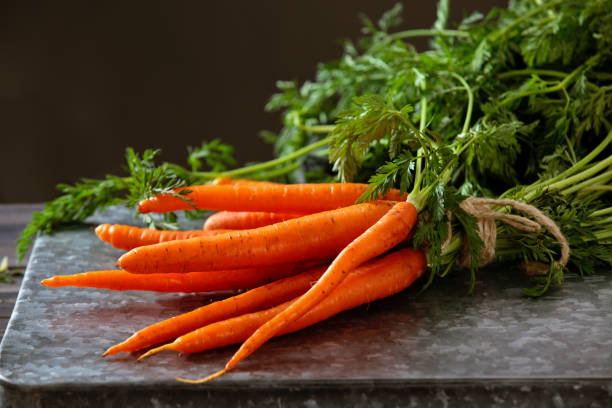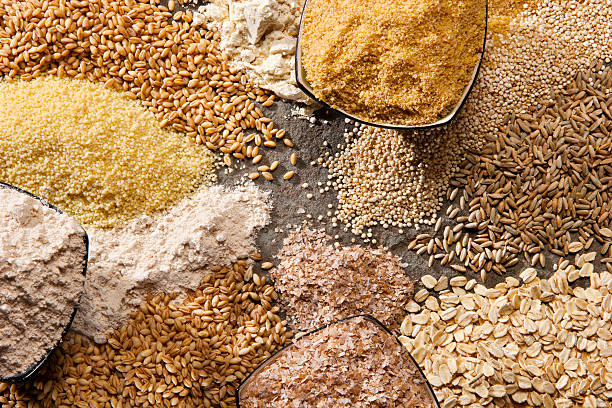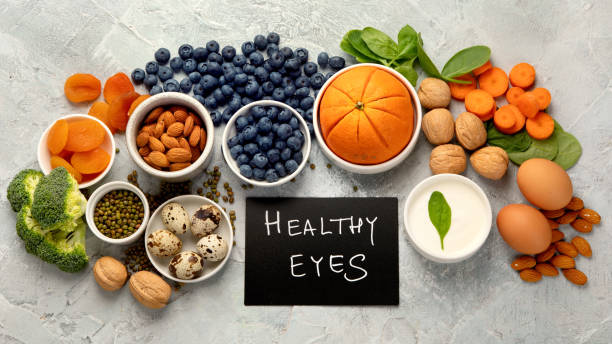Introduction
When people think of foods for eye health, carrots usually come first. That’s because carrots are rich in beta-carotene, a nutrient linked to good vision and night blindness prevention. Vitamin A from beta-carotene helps your eyes adjust to changes in light and keeps the surface of your eyes healthy. But did you know that many other foods are just as powerful for keeping your eyes sharp? Leafy greens, citrus fruits, fish, and even nuts provide key vitamins and antioxidants that your eyes need every day.
Your diet plays a big role in protecting against eye problems like age-related macular degeneration (AMD), cataracts, glaucoma, and dry eyes. Poor nutrition may speed up damage to your eyes, while the right foods can slow down or even prevent vision loss. By adding more nutrient-rich foods to your meals, you give your eyes the support they need to stay strong for years to come.
In this article, we’ll explore the best foods for healthy eyes—carrots and beyond. You’ll discover which nutrients matter most, how they work to protect your vision, and simple diet choices you can make today for long-term eye health.
Why Nutrition Matters for Eye Health
Your eyes need a mix of vitamins, minerals, and antioxidants to stay strong. Just like your heart or brain, your eyes are affected by what you eat every day. A diet that is rich in colorful fruits, vegetables, lean proteins, and whole grains gives your eyes the building blocks they need to function at their best.
Some nutrients reduce inflammation, others block harmful free radicals, and some support the tiny blood vessels that feed your eyes. Antioxidants like vitamin C and vitamin E protect against cell damage, while nutrients such as lutein and zeaxanthin filter harmful light. Omega-3 fatty acids keep your eyes moist and may lower the risk of dry eye syndrome. Without these nutrients, your vision may weaken over time, making it harder to see clearly.
According to the National Eye Institute (NEI), certain nutrients can lower the risk of common eye diseases such as cataracts and age-related macular degeneration (AMD). That means the right foods may not only support clear vision now but also help preserve your eyesight as you age. Making smart food choices today is one of the simplest steps you can take to protect your vision for the future.

Carrots: The Classic Eye Food
Carrots have earned their reputation for eye health. They’re packed with beta-carotene, which your body converts into vitamin A. This vitamin helps your eyes adjust to light changes and supports clear vision.
Benefits of Carrots for Eyes
- High in beta-carotene for vitamin A production
- Supports night vision
- Helps prevent dry eyes
While carrots are great, they’re not the only eye-friendly food you should rely on. Let’s go beyond carrots to see what else belongs on your plate.
Leafy Greens: Lutein and Zeaxanthin Powerhouses
Dark leafy greens like spinach, kale, and collard greens are loaded with lutein and zeaxanthin. These antioxidants filter harmful blue light and protect the retina from damage.
Why Leafy Greens Matter
- Lower the risk of cataracts
- Protect against macular degeneration
- Rich in vitamins C and E for added eye support
A study published in the American Journal of Ophthalmology found that people who eat more lutein-rich foods have healthier retinas.
Try adding spinach to your smoothies, kale to your salads, or collard greens as a side dish.
Fish: Omega-3 Fatty Acids for Dry Eyes
Fatty fish like salmon, tuna, mackerel, and sardines are excellent for eye health. They contain omega-3 fatty acids, which support the tear film that keeps your eyes moist.
Benefits of Omega-3s for Vision
- Reduce symptoms of dry eye syndrome
- Support healthy retinal function
- Protect against age-related macular degeneration
If you don’t eat fish, you can also get omega-3s from chia seeds, flaxseeds, or walnuts.
Eggs: A Complete Eye-Health Package
Eggs are a simple, affordable food with big eye benefits. The yolks are rich in lutein, zeaxanthin, zinc, and vitamin A—all vital for healthy eyes.
Egg Benefits for Eyes
- Zinc supports the retina and prevents night blindness
- Lutein and zeaxanthin lower risk of AMD
- Easy to include in breakfast or lunch
Scrambled, boiled, or in a salad, eggs are a vision-friendly choice.
Citrus Fruits: Vitamin C Boost
Citrus fruits like oranges, lemons, and grapefruits are loaded with vitamin C. This antioxidant helps maintain healthy blood vessels in your eyes.
Benefits of Vitamin C
- Slows the progression of cataracts
- Supports the health of eye tissue
- Strengthens the immune system, which benefits overall eye health
Snack on oranges or add lemon juice to your water for a daily dose of vitamin C.
Nuts and Seeds: Vitamin E Protection
Almonds, sunflower seeds, and hazelnuts are rich in vitamin E. This vitamin protects eye cells from oxidative stress.
Why Vitamin E Matters
- Reduces the risk of cataracts
- Works with vitamin C to protect eye tissue
- Supports overall eye health
A handful of almonds or sunflower seeds makes a quick, eye-friendly snack.

Whole Grains: Zinc and Vitamin E
Switching from refined grains to whole grains benefits more than just your heart. Whole grains like brown rice, quinoa, and oats provide zinc and vitamin E, which are linked to eye protection.
Whole Grain Benefits for Eyes
- Zinc helps deliver vitamin A from the liver to the retina
- Vitamin E fights free radicals that harm eye tissue
- Low-glycemic grains may reduce the risk of AMD
Try oatmeal for breakfast or swap white rice for brown rice at dinner.
Berries: Antioxidant-Rich Eye Support
Blueberries, blackberries, and strawberries are full of antioxidants that protect your eyes from oxidative stress.
Benefits of Berries
- Improve night vision
- Protect against macular degeneration
- Reduce inflammation in eye tissues
Adding a handful of berries to your yogurt or smoothie is a tasty way to support eye health.
Sweet Potatoes: Another Beta-Carotene Source
Like carrots, sweet potatoes are high in beta-carotene. They also contain vitamin C and fiber, making them a well-rounded choice.
Why Sweet Potatoes Help Vision
- Provide vitamin A for clear vision
- Contain antioxidants that protect the retina
- Offer a healthier alternative to refined carbs
Baked or roasted, sweet potatoes are a delicious eye-friendly side dish.
Bell Peppers: Vitamin C Superstars
Bell peppers—especially red and yellow ones—are loaded with vitamin C. They also contain lutein and zeaxanthin.
Eye Health Benefits of Bell Peppers
- Protect against cataracts
- Support blood vessels in the eyes
- Provide antioxidants for overall vision health
Add bell peppers to salads, stir-fries, or sandwiches for a crunch that benefits your eyes.
Dark Chocolate: A Sweet Treat for Vision
Believe it or not, dark chocolate can also support your eyes. It contains flavonoids, which improve blood flow to the retina.
Benefits of Dark Chocolate
- Enhances contrast sensitivity
- Protects retinal blood vessels
- Provides antioxidants for overall health
Choose chocolate with at least 70% cocoa for the best benefits.

Putting It All Together: A Diet for Healthy Eyes
The best foods for healthy eyes go far beyond carrots. While carrots are a great source of vitamin A, your eyes need a wider variety of nutrients to stay in top shape. A balanced diet with a mix of colorful fruits, vegetables, proteins, and healthy fats can keep your vision strong and lower your risk of eye problems as you age. Eating a rainbow of foods ensures that you’re getting all the vitamins, minerals, and antioxidants your eyes depend on.
Here’s a quick list to remember and why each group matters:
- Carrots and sweet potatoes → Vitamin A and beta-carotene
Support clear vision, especially at night, and help prevent dry eyes. - Leafy greens → Lutein and zeaxanthin
Filter harmful blue light and reduce the risk of cataracts and macular degeneration. - Fish and seeds → Omega-3 fatty acids
Keep eyes moist, reduce inflammation, and support healthy retinal function. - Eggs and whole grains → Zinc and lutein
Improve night vision and help deliver vitamin A to the retina. - Citrus fruits and bell peppers → Vitamin C
Strengthen blood vessels in the eyes and protect against cataracts. - Nuts and dark chocolate → Vitamin E and antioxidants
Protect eye cells from damage caused by free radicals.
By including these foods in your daily meals, you’re giving your eyes the nutrition they need to stay sharp and healthy. Even small changes—like swapping chips for nuts or adding spinach to your smoothie—can make a big difference for your vision over time.
Tips for Protecting Your Eyes Beyond Food
Eating well is important, but eye health also depends on lifestyle choices. Even if your diet is full of vision-friendly foods, daily habits can either protect or harm your eyes. By combining good nutrition with smart lifestyle practices, you give your eyes the best chance to stay healthy for years to come. Simple changes in how you care for your eyes every day can lower the risk of problems like cataracts, digital eye strain, and age-related vision loss.
Here are a few key habits to follow along with a healthy diet:
- Wear sunglasses to block harmful UV rays
UV radiation from the sun can damage the retina and raise your risk of cataracts. Quality sunglasses protect your eyes the same way sunscreen protects your skin. - Take breaks from screens to reduce digital eye strain
Staring at phones, computers, or TVs for too long can cause dryness, blurred vision, and headaches. Follow the 20-20-20 rule: every 20 minutes, look at something 20 feet away for 20 seconds. - Get regular eye exams, especially after age 40
Eye exams can catch issues like glaucoma or AMD early, when treatment works best. Even if your vision seems fine, checkups are important for long-term protection. - Stay hydrated to prevent dry eyes
Drinking enough water keeps your eyes moist and comfortable. Dehydration can make dry eye symptoms worse, especially if you spend time in air-conditioned or heated spaces.
By combining these lifestyle steps with nutrient-rich foods, you create a strong foundation for healthy eyes and clear vision at any age.
Conclusion: Your Next Step Toward Better Vision
Carrots are great for your eyes, but they’re only the beginning. Your vision depends on many different nutrients, and no single food can provide them all. From leafy greens and fish to citrus fruits and dark chocolate, your plate can become a powerful tool for protecting your vision. A variety of foods ensures that you get the right balance of vitamins, minerals, and antioxidants that keep your eyes strong and healthy.
Start by adding just one or two of these foods into your meals this week. It can be as simple as tossing spinach into a salad, swapping chips for almonds, or enjoying salmon for dinner. Over time, these small steps can add up to big improvements in your eye health. The more consistent you are with your choices, the more protection you give your vision against problems like cataracts, dry eyes, and age-related macular degeneration.

